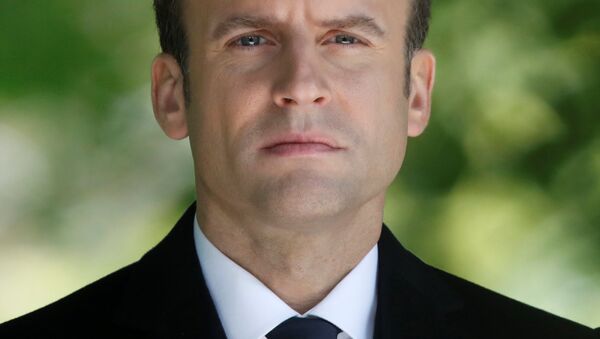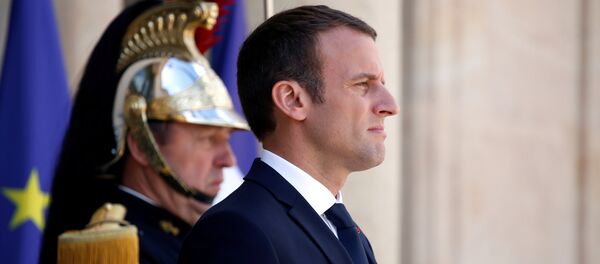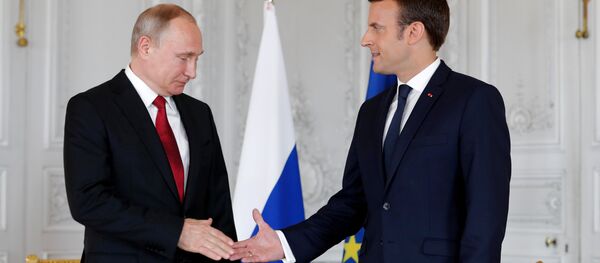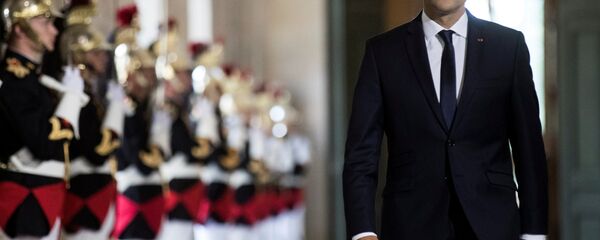MOSCOW (Sputnik) — French President Emmanuel Macron’s popularity has plummeted to one of the lowest levels on record for a new French president just a few months after his election on May 7 due to the discrepancy between the high expectations raised during his election campaign and the lack of any true reforms or visible results in terms of foreign policy or the internal affairs, Nicolas Dhuicq, a French politician and member of The Republican party, told Sputnik on Tuesday
“Public opinion has a low level of culture in economics, so voters thought that within a few weeks unemployment would fall and reforms would change their everyday life. The second reason is that no meaningful law has been adopted yet. We saw only 'much ado about nothing.' The law concerning elected people has nothing to do with regular people and his foreign trips and efforts haven't changed anything not only internationally but also for French citizens,” Dhuicq said.
An IFOP survey provided similar statistics for Macron's predecessor Francois Hollande, whose rating also dropped in the first summer of his presidency, however, only by 2 percent, from 56 percent in July 2012 to 54 percent in August that year, while in 2007, then-President Nicolas Sarkozy saw his approval rating climb from 66 percent in July to 69 percent in August.
Roman God or Just Gifted Student
Reality quickly started to cast a shadow over the youngest president in modern French history, who raised himself to the rank of the king of the gods saying he wanted to rule as "Jupiter" above the political fray, according to the lawmaker.
“Macron is starting to pay for his foolishness linked to his still teenage-like way of thinking. Not a regular teenager, but a gifted young grown-up acting as if he was still in the competitive school where he was a gifted student,” Dhuicq, who is also a psychiatrist, pointed out, when drawing a psychological portrait of the president.
According to him, Instead of improving Macron’s reputation among French voters by fulfilling his campaign promises, the president's office was forced to deal with his "next royal wish" to make his wife a paid adviser, with a new title of a first lady, along with the public outcry caused by news that the president spent 26,000 euros ($31,000) on makeup during his first three months in office.
According to the politician, the attention to his personal image looked hypocritical and particularly awkward because of his political party, En Marche, is in the process of adopting a new legislature that will make it illegal for parliamentarians to hire close relatives.
“About his wife, there is a deep incoherent idea between forbidding MPs to have a relative working with them and have the President's wife given an official role,” Dhuicq said.
Row Between Military and Elysee Goes Public
Emmanuel Macron, who during his presidential campaign promised to increase defense spending, once in office not only went for a cut in military spending, but also publicly criticized the head of the French armed forces Pierre De Villeres, who allegedly had complained about the cuts in a closed-door parliamentary meeting. De Villeres chose to resign, pointing that in those circumstances he saw himself as no longer able to guarantee a robust defense force.
“Due to the terrorist attacks and the fact that many French families may have a relative in the army or security forces, there is an effective and respectful link between the military and public opinion. So, yes, the way the president acted with this institution and its chief looked childish and rude, it showed a lack of real deep authority based upon experience,” Dhuicq said.
Is Macron Out of Touch With Common People?
However, at the same time Macron and his wife welcomed the US pop singer Rhianna and rock star Bono, who came to France on a humanitarian mission, in the Elysee Palace in July.
The Republicans' lawmaker believes that this move did not add any political weight to France on the global scale and also put the president at risk of being seen as out of touch with the needs of the common French people.
“The kind of show we had about foreign affairs hasn't changed anything not only for world affairs but also for French citizens. Again the lack of real reforms is grinding unconsciously first, then consciously public opinion. We'll see it with laws about work, big business is already complaining they won't be sufficiently liberal-minded, and workers start to understand you can't promise to be on both sides, that is rightist and leftist at the same time,” Dhuicq said.
Earlier in August, the communist-backed CGT called for a one-day strike on September 12, while left-wing Jean-Luc Melenchon called for a major anti-Macron rally in Paris on September 23.
“I was surprised to hear yesterday one of my medical secretaries ready to go on strike for the first time in her life. There is a risk that strikes organized by regular trade unions, which represent fewer and fewer workers in France, will be overshadowed by Melenchon’s team," he said.
Macron is likely to face a big test next month if he is to start implementing one of his most politically controversial ideas to revamp the French labor code. His predecessor Hollande was besieged by protests suggesting far less dramatic changes to the labor laws last year.





